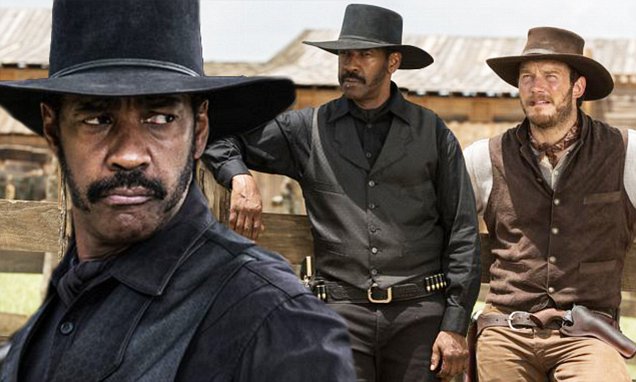
The new movie Magnificent Seven by filmmaker Antoine Fuqua, 50, is a pushback against Hollywood’s depiction of White America. It tells the well-kept secret history of black cowboys in the Wild West.
Most of Hollywood’s Western icons, from chiseled Robert Mitchum to the rugged Clint Eastwood to John Wayne, are invariably strong, brooding, and white. They played roles such as Jesse James, Billy the Kid, and Wyatt Earp. These roles are typically ranchers, lawman, or outlaws who are all battling for money or land on behalf of white America.
The truth is, the frontier was much more diverse than what is depicted on the big screen. In the 17th and 18th centuries, slaves who were brought to America that were familiar with cattle herding carved out better lives for themselves on the open range. Black cowboys were working on ranches throughout Texas by the early 19th century. After the Civil War, a greater number of black cowboys were employed to break horses and herd cattle across the rivers.
In American schools, however, this diverse period is almost universally misrepresented as part of “white history”, according to Jim Austin, who is president of the National Multicultural Western Heritage Museum in Fort Worth, Texas.
“What we found is that if you talk to some (modern) cowboys they’ll say 80 percent of the cowboys were actually people of color,” Austin said. A more accurate number is likely closer to 40 percent across the Western Frontier, he continued. Other historians would estimate a more conservative one in four, and only for some sections of Texas.
A classic example of Hollywood compounding ignorance over race in the Wild West is found in the fictional masked gunslinger “The Lone Ranger.” The Lone Ranger battled outlaws with Tonto, his Native American sidekick. The title character is widely believed to have been inspired by Bass Reeves, who was a real-life black lawman. Legend has it that Reeves went through his entire career without being shot, despite bagging 3,000 outlaws.
“Hollywood took Bass’s story and they flipped it, from an African-American man – six feet two inches, black hat, black horse, sidekick a Native American, always got his man – and turned it into ‘The Lone Ranger,'” Austin said.
What causes this change of race in cowboys’ races? Austin explained: Hollywood had feared that if they portrayed prominent black characters, their white audiences would be scared away. A rather unfounded fear, as modern studies consistently show that films with diverse casts tend to do better at the box office.
With this persistent depiction of white cowboys, it is hardly surprising that the racial makeup of America’s frontier—a melting pot of Europeans, Chinese, Mexicans, Native Americans, and blacks—is generally unknown. It is precisely this ignorance that Antoine Fuqua is hoping to banish with his remake Magnificent Seven. His remake is a re-imagining of the 1960 western movie that starred Steve McQueen. That movie, in turn, had been a remake of Akira Kurosawa’s Japanese-language epic Seven Samurai.
“Now it’s just not the white cowboy, the white soldier, but it’s all of us together. It’s white, black, Asian, Indians,” Fuqua said, “I said it needs to be an event and it needs to be something we haven’t seen — and more diverse. I said Denzel should play the lead role,”
Released in the United States in September, the movie follows Quentin Tarantino’s Westerns Django Unchained and The Hateful Eight among the few Hollywood hits about black cowboys. South Korean actor Byung-Hun Lee also has a prominent role in the movie.
Fuque’s Magnificent Seven follows the well-worn trope of a band of heroes battling unscrupulous bandits to defend their community. It is a story of people coming together from diverse backgrounds to fulfill a goal.
“Now it’s just not the white cowboy, the white soldier, but it’s all of us together. It’s white, black, Asian, Indians. It doesn’t matter anymore… We all have to come together to fight tyranny,” said Fuqua, 50.
It doesn’t take much research of the documents that chronical America’s pre-Civil War period to see that Fuqua’s version of the Wild West reflects reality more accurately than John Sturges’s original Magnificent Seven.
Today, other efforts to bring this unknown history to the public’s consciousness. One such group is the Oakland Black Cowboy Association. This group stages annual parades to raise awareness of the role of non-whites in settling the Old West and that people of all nationalities plied the great cattle trails and built the railroads.
The California group’s spokesman, Andre Alporter commented on Hollywood’s predominantly white producers, writers, and directors. They tend to “create stories and images that uplift them as a race.”
He continued, “They are the heroes, they wear the white hats, they go into exploding buildings and save the planet. It’s like white men did it all: ‘I thought of it, I invented it, I created it, I built it.’ And that’s not a representation of true America.”